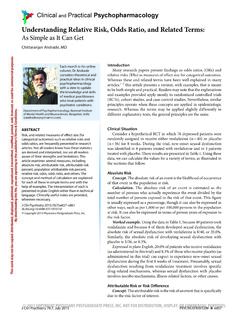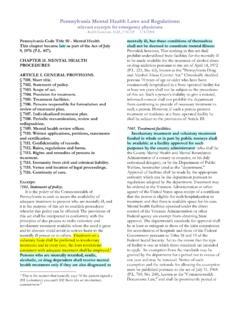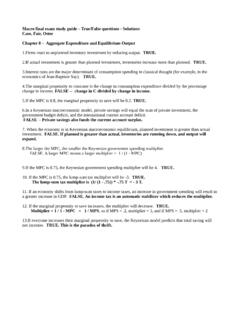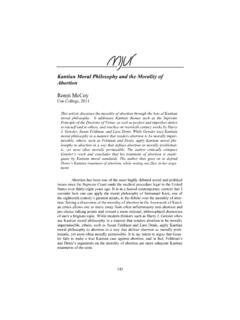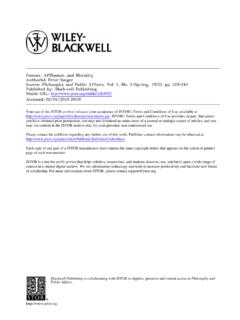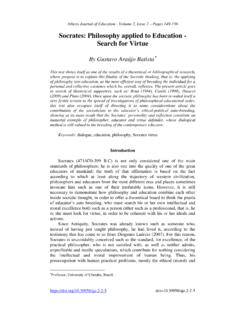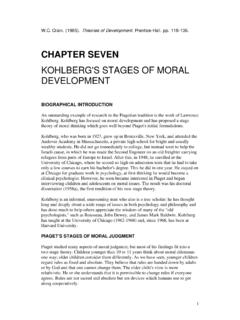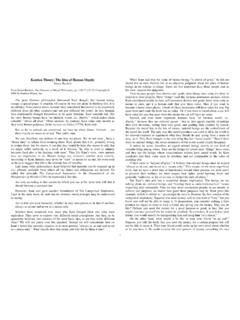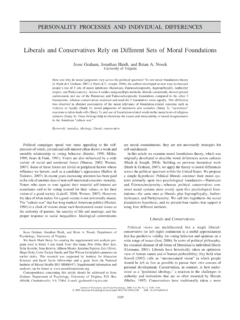Transcription of Groundwork for the Metaphysics of Morals
1 Groundwork [Ak : ]. for the Metaphysics of Morals Preface [Ak : ]. Ancient Greek philosophy was divided into three sciences: physics, ethics, and This division is perfectly suitable to the nature of the thing and one cannot improve upon it, except only by adding its principle, in order in this way partly to secure its completeness and partly to be able to determine correctly the necessary subdivisions. All rational cognition is either material, and considers some object, or formal, and concerns itself merely with the form of the understanding and of reason itself and the universal rules of thinking in general, without distinction among Formal philosophy is called logic, but material philosophy , which has to do with determinate objects and the laws to which they are subjected, is once again twofold.
2 For these laws are either laws of nature or of freedom. The science of the first is called physics, and that of the other is ethics; the former is also named doctrine of nature', the latter doctrine of Morals '. Logic can have no empirical part, , a part such that the universal and necessary laws of thinking rest on grounds that are taken from experience;. for otherwise it would not be logic, , a canon for the understanding or reason which is valid for all thinking and must be demonstrated. By con- trast, natural and moral philosophy can each have their empirical part, because the former must determine its laws of nature as an object of experi- ence, the latter must determine the laws for the will of the human being insofar as he is affected by nature the first as laws in accordance with which everything happens, the second as those in accordance with which [Ak 4:388].
3 Everything ought to happen, but also reckoning with the conditions under which it often does not happen. One can call all philosophy , insofar as it is based on grounds of experi- 1. According to Diogenes Laertius, Lives and Opinions of the Eminent Philosophers , this division was first devised by Zeno of Citium (335 265 ) and was charac- teristic of the Stoics. See, , Seneca, Epistles ; Cicero, On Ends 2. Cf. Critique of Pure Reason, A50 55/B74 79. 4 Groundwork for the Metaphysics of Morals ence, empirical, but that which puts forth its doctrines solely from princi- ples a priori, pure philosophy .
4 The latter, when it is merely formal, is called logic; but if it is limited to determinate objects of the understanding, then3 it is called Metaphysics . In such a wise there arises the idea of a twofold Metaphysics , the idea of a Metaphysics of nature and of a Metaphysics of Morals . Physics will thus have its empirical but also a rational part; and ethics likewise; although here the empirical part in particular could be called practical anthropology, but the rational part could properly be called All trades, handicrafts, and arts have gained through the division of labor, since, namely, one person does not do everything, but rather each limits himself to a certain labor which distinguishes itself markedly from others by its manner of treatment, in order to be able to perform it in the greatest perfection and with more facility.
5 Where labors are not so distin- guished and divided, where each is a jack-of-all-trades, there the trades still remain in the greatest barbarism. But it might be a not unworthy object of consideration to ask whether pure philosophy in all its parts does not require each its particular man, and whether it would not stand better with the learned trade as a whole if those who, catering to the taste of the public, are accustomed to sell the empirical along with the rational, mixed in all sorts of proportions5 unknown even to themselves calling themselves inde- pendent thinkers'.
6 6 and those who prepare the merely rational part quib- blers'7 if they were warned not to carry on simultaneously two enter- prises that are very different in their mode of treatment, each of which perhaps requires a particular talent, and the combination of which in a single person produces only bunglers: thus I here ask only whether the nature of the science does not require the empirical part always to be carefully separated from the rational, placing ahead of a genuine (empiri- cal) physics a Metaphysics of nature, and ahead of practical anthropology a Metaphysics of Morals , which must be carefully cleansed of everything 3.
7 1785: understanding, is called''. 4. Kant later includes principles of application'' drawn from the particular nature of human beings'' within Metaphysics of Morals '' itself, leaving practical anthropology''. to deal only with the subjective conditions in human nature that hinder people or help them in fulfilling the laws of a Metaphysics of Morals '' ( Metaphysics of Morals , Ak 6:217). 5. Verh ltnisse 6. Selbstdenker 7. Gr bler Groundwork for the Metaphysics of Morals 5. empirical, in order to know how much pure reason could achieve in both [Ak 4: 389].
8 Cases; and from these sources pure reason itself creates its teachings a priori, whether the latter enterprise be carried on by all teachers of Morals (whose name is legion) or only by some who feel they have a calling for it. Since my aim here is properly directed to moral philosophy , I limit the proposed question only to this: whether one is not of the opinion that it is of the utmost necessity to work out once a pure moral philosophy which is fully cleansed of everything that might be in any way empirical and belong to anthropology; for that there must be such is self-evident from the com- mon idea of duty and of moral laws.
9 Everyone must admit that a law, if it is to be valid morally, , as the ground of an obligation, has to carry absolute necessity with it; that the command You ought not to lie' is valid not merely for human beings, as though other rational beings did not have to heed it; and likewise all the other genuinely moral laws; hence that the ground of obligation here is to be sought not in the nature of the human being or the circumstances of the world in which he is placed, but a priori solely in concepts of pure reason, and that every other precept grounded on principles of mere experience, and even a precept that is universal in a certain aspect, insofar as it is supported in the smallest part on empirical grounds, perhaps only as to its motive, can be called a practical rule, but never a moral law.
10 Thus not only are moral laws together with their principles essentially distinguished among all practical cognition from everything else in which there is anything empirical, but all moral philosophy rests entirely on its pure part, and when applied to the human being it borrows not the least bit from knowledge about him (anthropology), but it gives him as a rational being laws a priori, which to be sure require a power of judgment sharp- ened through experience, partly to distinguish in which cases they have their application, and partly to obtain access for them to the will of the human being and emphasis for their fulfillment, since he,8 as affected with so many inclinations, is susceptible to the idea of a pure practical reason, but is not so easily capable of making it effective in concreto in his course of life.

